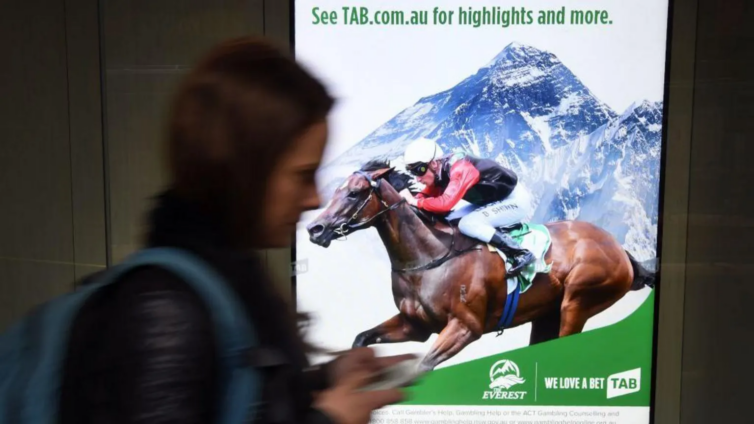Like so many in Australia, Sam grew up in a community where having a punt was synonymous with sport.
“Our friends, our family would ask ‘Oh who are you betting on this week?’ That was the normal conversation that occurred,” his sister Amy - who is not using her real name - says.
Looking back, she blames that normalisation of gambling - the way it crept into their home and baked itself into social interactions - for her brother’s addiction, and for the suffering he endured before taking his life.
“It just destroyed him physically and emotionally,” she explains. “We tried everything. We were a close family, but we obviously didn’t know how bad it was - it crushed him.”
Amy is one of dozens who came forward to testify in a bipartisan parliamentary inquiry into the impacts of gambling in Australia - which wagers more per capita than any other country.
The probe found that there were “few safeguards” to protect those battling addiction and recommended 31 reforms to avoid “grooming” a new generation of children to gamble, starting with a three-year phased ban on advertising.
Now, pressure is mounting on Prime Minister Anthony Albanese - both externally and from within his party - to act, with polling suggesting a majority of people support the move.
But the government has signalled it may instead opt for a cap to limit advertising. It has cited the role gambling ad revenue plays in propping up the nation’s ailing free-to-air broadcasters, as well as warnings from wagering companies that a ban could drive consumers offshore.
Doing so would result in huge tax losses on Australian betting platforms which currently fund “vital services”, the peak body representing the industry says.
The debate has spurred accusations that corporate interests are standing in the way of common-sense reform.
It has also spotlighted the deep-rooted links between sport, gambling, and entertainment in Australia.
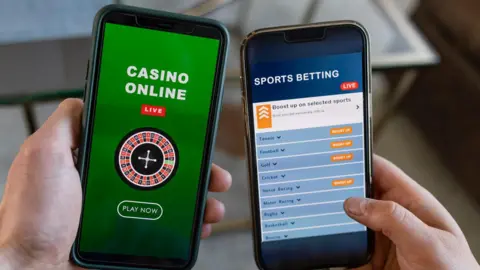
A betting boom
Betting occupies a unique space in Australian culture.
In the 1980s, it became the first country to deregulate its gambling industry, making it possible for slot machines - once only permitted inside casinos - to expand into licensed pubs and clubs.
Today, Australia is home to roughly 0.33% of the world's population, but a fifth of all “pokies”- the colloquial term used for the machines.
The last two decades have also seen an explosion in the popularity of online betting, particularly when it comes to sport. Estimates show Australians are spending approximately A$25bn ($16.8bn; £12.9bn) on legal wagers each year - with 38% of the population gambling weekly.
Experts argue that sophisticated marketing has aided that boom, while sponsorship deals, partnerships, and kickbacks given to prevalent sporting bodies, have helped legitimise the industry
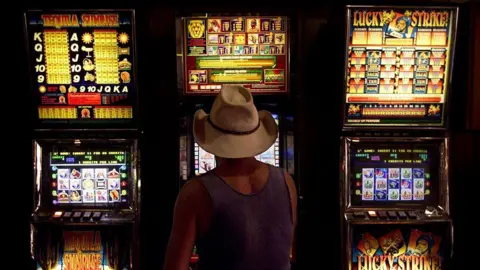
Sean - not his real name - has been gambling legally, and often obsessively, for more than 18 years. He was introduced by a friend to sports betting as a teenager, and from there, things snowballed. “Some days I couldn't sleep unless I knew that I had a bet on. It got to the point where I was betting on sports I’d never seen in countries I’d never heard of,” he told the BBC.
Now 36 and seeking help from sponsors, he doesn’t like to keep tabs on what feels like a lifetime of losses, but he puts the total figure in the ballpark of A$2m.
He says the relationship breakdowns and years of isolation are harder to quantify: “If I never gambled, I would be married with kids right now”.
One academic paper found that like Sean, 90% of Australian adults and roughly three-quarters of children aged eight to 16 years see betting as a "normal part of sport”. Advocates like Martin Thomas argue this is evidence that the practice “has seeped into every corner of society”.
“Our kids know just as much about the odds on a game and multi bets as they do their favourite players,” he tells the BBC.
In Amy’s view, as well as making it harder for people of all ages to escape gambling, that normalisation has created a dangerous subtext: that any adverse impacts - such as debt or addiction - are the fault of the individual, not the system.
“To go and watch a sporting event and see it saturated with betting advertising, you're like, ‘Oh, I'm the problem. Because everyone does this’, you know what I mean?
“That’s what my brother thought.”
Like many advocates, she wants to see gambling reframed as a major public health issue rather than a recreational pursuit, given surveys have shown that nearly half of those engaging in the practice are at risk of, or already experience, its associated harms – such as financial hardship, family violence, depression, and suicide.
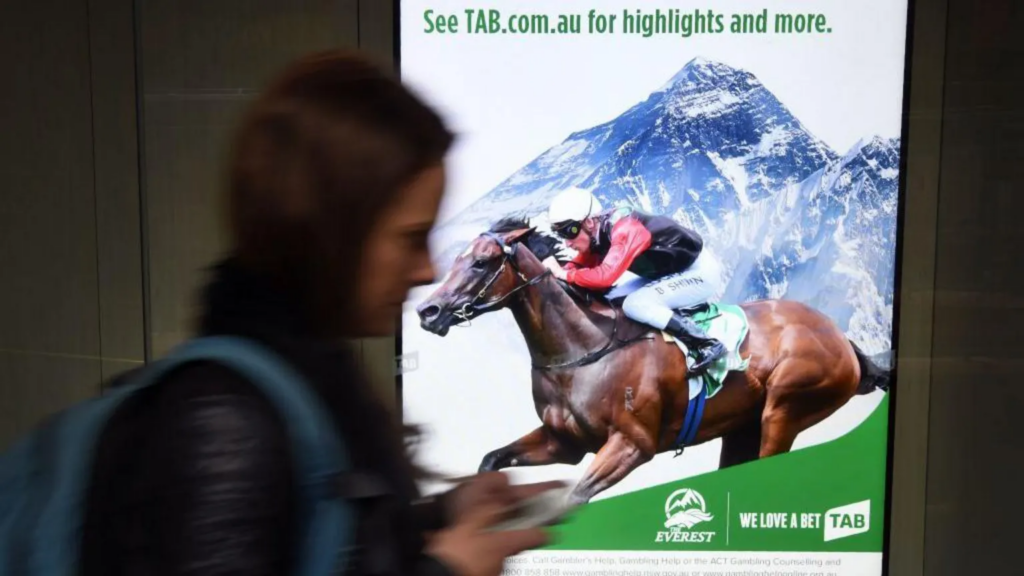
Research suggests that a prohibition on advertising could be the first step in achieving that aim. And advocates say there’s a well-trodden path the government could follow. Mr Thomas cites Australia’s decision to ban tobacco adverts in 1992 - which has been credited with dramatically reducing smoking rates - as proof of what’s possible.
But while Prime Minister Anthony Albanese has described the “saturation of gambling advertising” as “untenable”, he’s yet to commit to a course of action.
Instead, he has pointed to his government’s other initiatives when questioned - such as banning credit card use in online wagering and creating a register for people to exclude themselves from betting sites. At times, he’s also framed gambling as an age-old problem.
“[This] has been an issue in our society I suspect, since man and woman walked, and had a bet on who could ride the horse the fastest or who could run from rock to rock, probably before there were buildings,” he told parliament on Wednesday.
‘The house always wins’
The peak body representing Australia’s wagering companies has described a blanket ban as “a step too far” and thrown its weight behind the government’s proposed cap – which would limit ads online and during general TV programming.
“By doing this, the expectations of the community to see less advertising would be met, while also maintaining the crucial support to sporting codes and local broadcasters,” Responsible Wagering Australia’s CEO Kai Cantwell said in a statement.
But Dr Andrew Hughes, a lecturer in marketing at The Australian National University, has cast doubt over how crucial that financial support is - given that Nielsen data shows that the lion’s share of ad money the nation’s broadcasters take in comes from a range of other sectors, rather than betting platforms.
And independent senators, like David Pocock, have criticised the logic of using money from wagering to prop up the media.
“Journalism is incredibly important, but it shouldn't be dependent on flogging products we know are harmful, and which cause addiction, personal issues, family breakdowns, and in some cases, suicide,” he told the BBC.
“The government should have the imagination to look at other ways of plugging that gap.”
Mr Pocock is one of several senators to publicly question whether betting companies and the industries they finance, are interfering with policy decisions - citing their extensive lobbying efforts and history of large political donations.
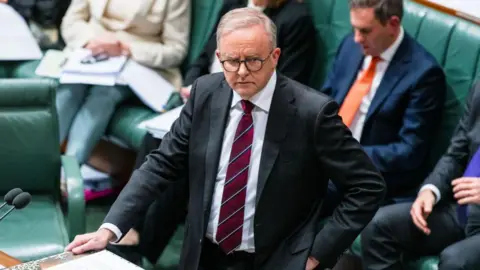
Last week, he joined 20 parliamentarians from across the political spectrum to sign an open letter backing a prohibition on advertising, while also calling for a free vote on the issue to allow MPs in Mr Albanese’s party to cross the floor, without facing repercussions.
Several medical bodies have also thrown their support behind a ban, as has an expert panel appointed by the government to probe how to bring down rates of domestic violence in Australia – adding to the mounting pressure Mr Albanese is facing.
The government already runs warnings on gambling advertisements reminding people of the risks.
But Sean says it does little to deter those caught in the crosshairs of addiction.
“I know the house always wins, but every time I'm ready to have a punt that all goes out the window,” he explains. "I start thinking I'm about to pull off that one win that's going to take me away from everything. That win that’s going to get everything back.”
Although nothing has been finalised and Mr Albanese’s cabinet is still weighing its options, for Amy, the debate itself has become too “insensitive” to follow.
She can’t comprehend what the hold-up is and wants answers.
“Anyone who understands this issue would without a doubt agree to a full advertising ban – that’s what the evidence says,” she tells the BBC. “It feels like these lobbyists own the government… We’re dangling this dangerous product in front of everyone and normalising it, and the worst-case scenario is what happened to us.
“My family – they’ll never recover. It’s not something that you recover from.”
Latest Stories
-
Bridging the skills gap: Ghana’s imperative shift towards TVET to combat graduate unemployment
29 minutes -
Chief Imam calls for an end to Gaza atrocities in Eid-Al-Adha message
3 hours -
High Court restrains GRNMA from continuing with strike for 10 days
4 hours -
Bole gets new DVLA office
5 hours -
CCCFS applauds Mahama’s environmental pledges, urges stronger waste management measures
5 hours -
Uphold integrity in engineering – IET President charges newly inducted professionals
5 hours -
World Menstrual Hygiene Day: ofi distributes reusable sanitary pads with impactful celebrations at Konongo-Odumase SHS
6 hours -
Ukraine and Ghana to deepen cooperation in cybersecurity and digital innovation
7 hours -
Daily Insight for CEOs: Data-driven decision-making – A CEO’s edge in uncertainty
7 hours -
This Saturday on Newsfile: GH¢1 fuel levy and OSP declaring Ofori-Atta wanted again
7 hours -
Mahama announces steps to improve Islamic education nationwide
8 hours -
Eidul al-Adha: Drugs worse than alcohol – Imam Suleman warns Muslim youth
8 hours -
Fuel Levy: What crime have Ghanaians committed? – Dr Amin Adam questions gov’t
9 hours -
Postecoglou sacked by Spurs after Europa League win
10 hours -
Employee fraud is everywhere, be intentional about stopping it – Expert counsels
11 hours

